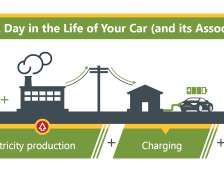DOE tool allows consumers to estimate localized upstream greenhouse gas emissions for EVs and PHEVs
Green Car Congress
JUNE 2, 2021
The US Department of Energy (DOE) has published a Beyond Tailpipe Emissions Calculator that provides estimates of total greenhouse gas (GHG) emissions associated with driving an electric vehicle (EV) or plug-in hybrid electric vehicle (PHEV), including emissions from the production of electricity used to power the vehicle.






































Let's personalize your content